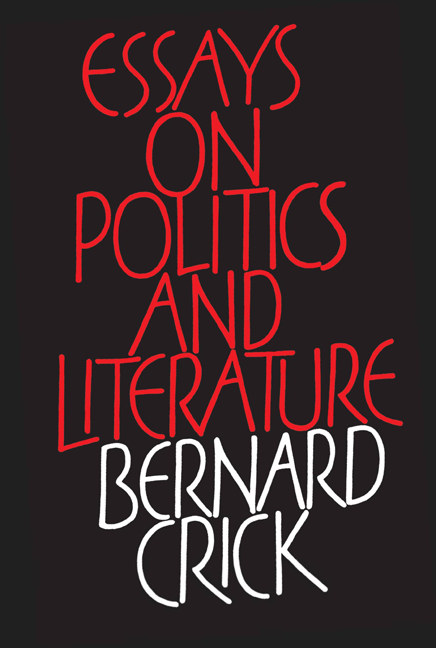Book contents
- Frontmatter
- Contents
- Preface
- Acknowledgements
- Foreword by David Daiches
- One Literature and Politics
- Two The Political in Britain’s Two National Theatres
- Three Young Writers of the Thirties
- Four Koestler’s Koestler
- Five Hannah Arendt: Hedgehog or Fox?
- Six Beatrice Webb as English Diarist
- Seven Words
- Eight My Lse
- Nine Reading The Observer as a Complex Text
- Ten On the Difficulties of Writing Biography and of Orwell’s in Particular
- Eleven Reading Nineteen Eighty-Four As Satire
- Twelve Animal Farm For Schools
- Thirteen Orwell and English Socialism
- Fourteen On the Orwell Trail
- Fifteen Wedekind’s Spring Awakening
- Sixteen Horvath’s Tales From the Vienna Woods
- Seventeen Pinter’s No Man's Land
- Eighteen Polly By Gaslight
- Nineteen Edgar Catches Jenkins’ Ear at the Barbican
- Twenty Barrault at the Barbican
- Index
One - Literature and Politics
Published online by Cambridge University Press: 24 September 2020
- Frontmatter
- Contents
- Preface
- Acknowledgements
- Foreword by David Daiches
- One Literature and Politics
- Two The Political in Britain’s Two National Theatres
- Three Young Writers of the Thirties
- Four Koestler’s Koestler
- Five Hannah Arendt: Hedgehog or Fox?
- Six Beatrice Webb as English Diarist
- Seven Words
- Eight My Lse
- Nine Reading The Observer as a Complex Text
- Ten On the Difficulties of Writing Biography and of Orwell’s in Particular
- Eleven Reading Nineteen Eighty-Four As Satire
- Twelve Animal Farm For Schools
- Thirteen Orwell and English Socialism
- Fourteen On the Orwell Trail
- Fifteen Wedekind’s Spring Awakening
- Sixteen Horvath’s Tales From the Vienna Woods
- Seventeen Pinter’s No Man's Land
- Eighteen Polly By Gaslight
- Nineteen Edgar Catches Jenkins’ Ear at the Barbican
- Twenty Barrault at the Barbican
- Index
Summary
Originally in The Critical Quarterly, vol. 22, no. 2, (Summer 1980) and a revised version was given as the Hannah Arendt Memorial Lecture at the University of Southampton 1983.
If one set a group of good students an essay with this title, one might anticipate any or all of these interpretations: (i) the antipathy of the two concepts; (ii) their necessary interdependence; (iii) the duty of writers to commit themselves; (iv) the duty of writers not to commit themselves; (v) the influence of politics in writers; (vi) the influence of writers on politics; (vii) the clash of censorship and free expression; (viii) the control and use of writers by the state in other countries than our own; (ix) examples of good and bad political writing; (x) a case for the privatisation of public libraries; (xi) a demand for subsidies for unsuccessful writers; and (xii) a demonstration (granted certain theoretical premises) that Literature is a bourgeois concept and that the novel has a special role in maintaining the class system. There could be other angles. There are more than seven types of ambiguity. And as is said of the Irish problem, every time a solution is offered the question is changed. But Professor Flowers comes to help us all; he is general editor of a recent series of short books with the general title ‘Writers and Politics’: J.A. Morris, Writers and Politics in Modern Britain. C.E. Williams, Writers and Politics in Modern Germany. J.E. Flower, Writers and Politics in Modem France. John Gatt-Rutter, Writers and Politics in Modem Italy. Janet Mawby, Writers and Politics in Modem Scandanavia. J. Butt, Writers and Politics in Modern Spain, all published by Hodder and Stoughton, 1977-9.
What the series is not about is at least clear. It is not about the sociology of literature, which is a welcome change. Long before the Frankfurt Schule and the epochal birth of the Hungarian trimmer, George Lukács, even before the coming of Raymond Williams to Cambridge, German students of Shakespeare in the 1900s used to learn all about the social composition of the audience at the Globe, who looked after the horses and when oranges were first sold in English theatres, long before they came to read the texts for themselves, still less to deconstruct them.
- Type
- Chapter
- Information
- Essays on Politics and Literature , pp. 1 - 19Publisher: Edinburgh University PressPrint publication year: 2020

